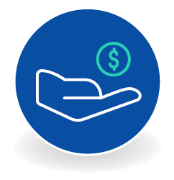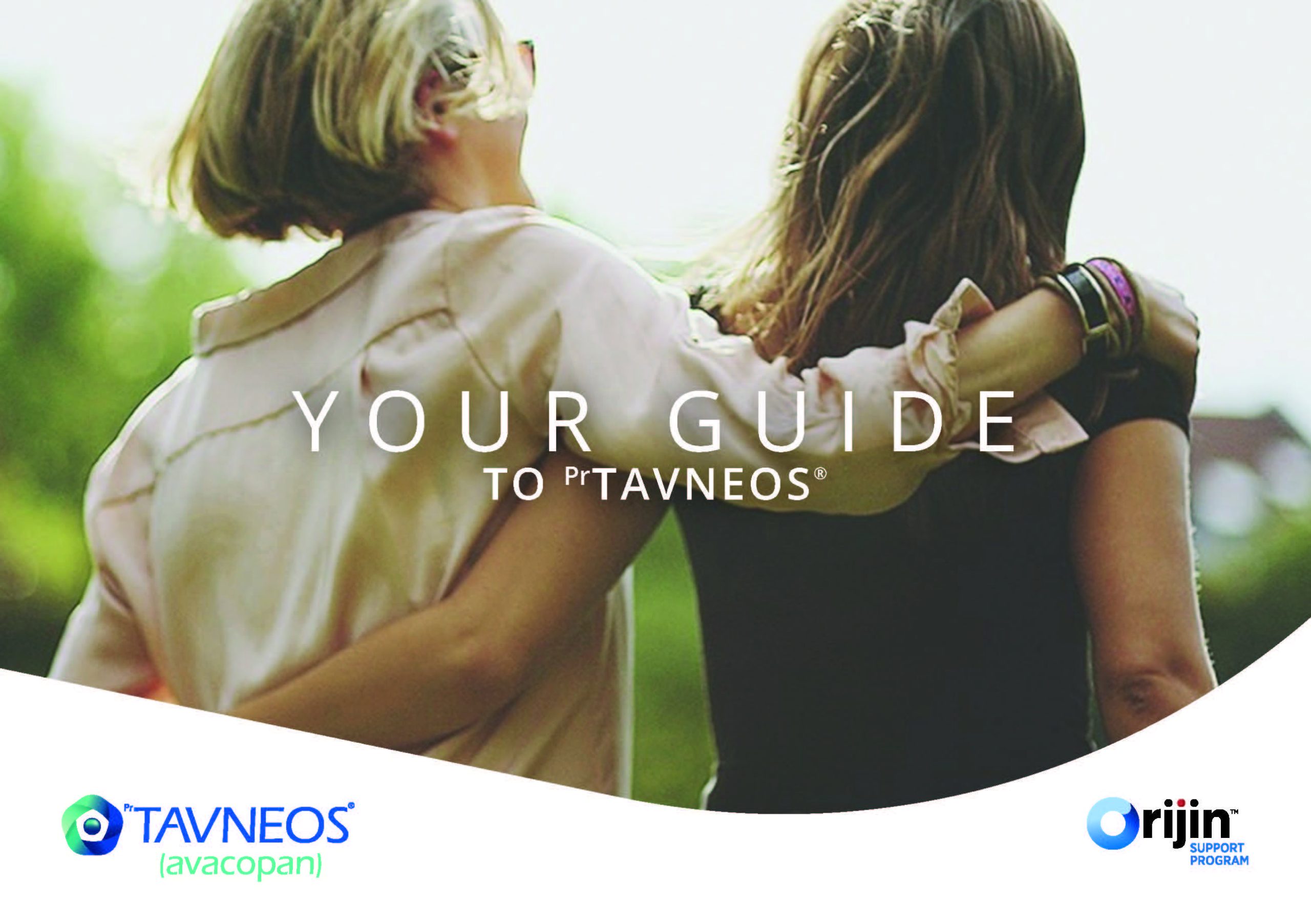
Starting PrTAVNEOS®?
What the ORIJIN® Patient Support Program has to offer:
ORIJIN is the patient support program for people taking TAVNEOS. ORIJIN offers many services, including:

Reimbursement navigation assistance

Co-pay for patients with coverage

Support when transitioning between the hospital and your home
What is TAVNEOS used for?
TAVNEOS is used to treat adults with conditions known as severe active anti-neutrophil cytoplasmic autoantibody (ANCA)-associated vasculitis.
These conditions include:
- granulomatosis with polyangiitis (GPA)
- microscopic polyangiitis (MPA)
TAVNEOS is used along with other medicines to treat your condition.
How does TAVNEOS work?
TAVNEOS binds to a receptor in the body and blocks inflammation. This can be detected within hours. Your symptoms may improve within the first 4 weeks.What are the possible side effects from using TAVNEOS?
These are not all the possible side effects you may have when taking TAVNEOS. If you experience any side effects not listed here, tell your healthcare professional.
Side effects may include:
- high blood pressure
- fatigue
- nausea, vomiting, diarrhea, pain in the belly
- headache
- rash
- flu, cold
- cold sore
- gastroenteritis (stomach flu)
Talk to your healthcare professional in all cases if you experience:
- Increased levels of a blood enzyme (creatine phosphokinase)
- Infection of the respiratory system, mouth, skin, or ear
- Liver problems
- Pneumonia (infection of the lungs)
- Urinary tract infection
- Decreased levels of white blood cells
- Hepatitis B virus reactivation
Talk to your healthcare professional only in severe cases if you experience:
- Nausea
Stop taking TAVNEOS and get immediate medical help if you experience:
- Allergic reaction: difficulty swallowing or breathing, wheezing, swelling of the face, lips, tongue, or throat.
- Angioedema (serious swelling under the skin): swelling of the face, throat, arms, legs or genitals, rash or hives, pain and warmth of affected areas, throat tightness, difficulty breathing, trouble swallowing, abdominal pain, vomiting, feeling dizzy, chest pain.
If you have a troublesome symptom or side effect that becomes bad enough to interfere with your daily activities, tell your healthcare professional.
Other resources

Vasculitis Foundation Canada is a volunteer organization that offers information and resources for people with vasculitis like granulomatosis with polyangiitis (GPA) or microscopic polyangiitis (MPA).
Otsuka Canada Pharmaceutical Inc. does not operate and is not responsible for the content on this third-party site. If you have any questions or concerns about the products, services, or content on the linked third-party site, please contact the third party directly.
FAQ
TAVNEOS is used to treat adults with conditions known as severe active anti-neutrophil cytoplasmic autoantibody (ANCA)-associated vasculitis.
These conditions include:
- granulomatosis with polyangiitis (GPA)
- microscopic polyangiitis (MPA)
TAVNEOS is used along with other medicines to treat your condition.
TAVNEOS binds to a receptor in the body and blocks inflammation. This can be detected within hours. Your symptoms may improve within the first 4 weeks.
Store TAVNEOS at room temperature (15 to 30°C or 59 to 86°F) and in the original package. Keep out of reach and sight of children.
Take 3 capsules with food in the morning and 3 capsules with food in the evening, as directed by your healthcare professional. You should swallow your capsules whole with water. Do not crush, chew, or open the capsules.
These are not all the possible side effects you may have when taking TAVNEOS. If you experience any side effects not listed here, tell your healthcare professional.
Side effects may include:
- high blood pressure
- fatigue
- nausea, vomiting, diarrhea, pain in the belly
- headache
- rash
- flu, cold
- cold sore
- gastroenteritis (stomach flu)
Talk to your healthcare professional in all cases if you experience:
- Increased levels of a blood enzyme (creatine phosphokinase)
- Infection of the respiratory system, mouth, skin, or ear
- Liver problems
- Pneumonia (infection of the lungs)
- Urinary tract infection
- Decreased levels of white blood cells
- Hepatitis B virus reactivation
Talk to your healthcare professional only in severe cases if you experience:
- Nausea
Stop taking TAVNEOS and get immediate medical help if you experience:
- Allergic reaction: difficulty swallowing or breathing, wheezing, swelling of the face, lips, tongue, or throat.
- Angioedema (serious swelling under the skin): swelling of the face, throat, arms, legs or genitals, rash or hives, pain and warmth of affected areas, throat tightness, difficulty breathing, trouble swallowing, abdominal pain, vomiting, feeling dizzy, chest pain.
If you have a troublesome symptom or side effect that becomes bad enough to interfere with your daily activities, tell your healthcare professional.
- have liver problems.
- have hepatitis B virus (HBV) infection.
- are pregnant, think you might be pregnant, or are planning to become pregnant. It is not known if TAVNEOS may harm your unborn baby.
- are breastfeeding or plan to breastfeed. It is not known if TAVNEOS can pass into your milk and harm your baby. Talk to your healthcare professional about the best way to feed your baby if you take TAVNEOS.
- have an infection or infections that often come back.
- have heart problems.
- plan to receive a vaccine. It is recommended that you receive vaccinations before starting treatment with TAVNEOS.
- are taking the medicines cyclophosphamide and azathioprine.
Vasculitis involves inflammation of the blood vessels. This inflammation can cause weakening and narrowing of the blood vessels, which can progress to blockages.
Anti-neutrophil cytoplasmic autoantibody (ANCA)-associated vasculitis, also called AAV, is a type of vasculitis that affects small blood vessels in the body.
This type of vasculitis results from the immune system attacking blood vessel cells by mistake. Possible triggers for this immune system reaction include:
- Infections, such as hepatitis B and C;
- Blood cancers;
- Immune system diseases, such as rheumatoid arthritis, lupus, and scleroderma; or
- Reactions to certain drugs.



